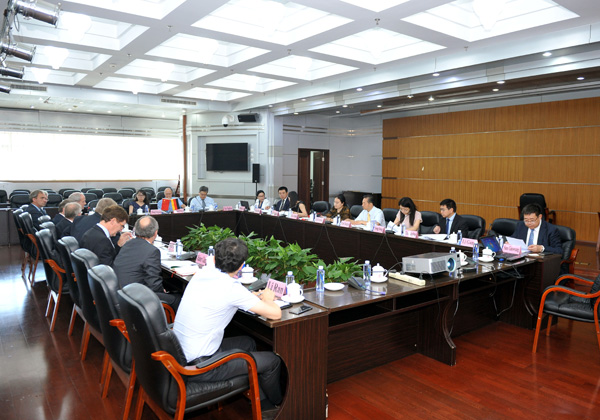
The China-Germany Working Group for Intelligent Manufacturing (Industry 4.0) held a meeting in Beijing on July 26th 2016. Jointly organized by the Chinese Ministry of Science and Technology (MOST) and the German Federal Ministry of Education and Research (BMBF), the meeting was co-chaired by Chen Jiachang, Deputy Director General of International Cooperation, MOST, and Dr. Herbert Zeisel, Deputy Director General of Key Technologies for Growth, BMBF. The aim was to implement a Joint Statement of Intent on the development and deployment of innovative plans in the fields of intelligent manufacturing (Industry 4.0) and intelligent services through further bilateral scientific and technological cooperation. The Joint Statement was signed in Beijing in January 2016 by Minister Wan Gang and his German counterpart Johanna Wanka. According to the Joint Statement, both countries should increase dialogue on innovations in intelligent manufacturing and services.
Representatives from governments introduced respective policies of intelligent manufacturing (Industry 4.0). Those from the business and research communities made keynote speeches on four topics: intelligent logistics, connectivity and digitalized equipment, learning factory, safety and reliability of intelligent manufacturing. Based on mutual consensus, the two ministries finalized a mechanism for cooperation in intelligent manufacturing, and decided to focus on intelligent logistics and intelligent factory in the first joint call for proposals. They also agreed to organize the first forum on intelligent manufacturing in the second half of 2016 to engage professionals and stakeholders from businesses, universities and research institutes. By then contents and means of cooperation in the next stage and joint research projects would be determined. In addition, the two sides exchanged ideas on such issues of common interest as network and data security, laying a solid foundation for deepened cooperation.
The meeting was attended by more than 20 representatives from MOST, the Chinese Ministry of Industry and Information Technology, Instrumentation Technology and Economy Institute, and Shenyang Institute of Automation under the Chinese Academy of Sciences, the BMBF, the TRUMPF Group, the German Mechanical Engineering Industry Association (VDMA), the Fraunhofer Institute for Software and Systems Engineering (ISST), the Karlsruhe Institute of Technology (KIT), and the German Embassy in China.

